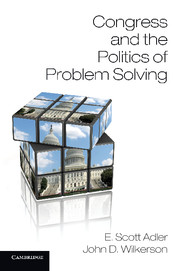Book contents
- Frontmatter
- Contents
- Tables and Figures
- Preface
- Part I
- Part II
- Part III
- Part IV
- 8 Problem Solving and Policy Focal Points
- 9 Problem Solving and the Dynamics of Policy Change
- 10 Problem Solving and American Politics
- Appendix A
- Appendix B Assignment of Bills across Issue Types
- Appendix C Calculating Committee Roll Rates
- Bibliography
- Index
10 - Problem Solving and American Politics
Published online by Cambridge University Press: 05 January 2013
- Frontmatter
- Contents
- Tables and Figures
- Preface
- Part I
- Part II
- Part III
- Part IV
- 8 Problem Solving and Policy Focal Points
- 9 Problem Solving and the Dynamics of Policy Change
- 10 Problem Solving and American Politics
- Appendix A
- Appendix B Assignment of Bills across Issue Types
- Appendix C Calculating Committee Roll Rates
- Bibliography
- Index
Summary
Listen, the Founders gave us a committee of 535 people. Frankly, it was not designed to work. My job is to make it work. And it is working. Is it slow? Yes. Is it frustrating? Yes. But what I take comfort in every day is that I know members on both sides of the aisle are trying to do the right thing for the American people….
Speaker John Boehner (2011)Congressional negotiations over the extension of the Bush tax cut in 2010 and the federal debt-ceiling increase and extension of the payroll tax holiday in 2011 confirm the very old adage about laws and sausages. Viewed from the outside, partisan or intercameral conflict appears reprehensible and irresponsible – why can’t our representatives behave like adults and just work out their differences? There are reasons for these stalemates, however. Like many high-stakes negotiations, legislators who stake out extreme bargaining positions and stick to them for as long as possible are sometimes rewarded. The visible nature of contemporary congressional politics and the fact that strong partisans tend to be more attentive to politics further encourages lawmakers to engage in public posturing as a prelude to decision making.
We have argued that legislating is more often a game of chicken than a game of winner-take-all. The players in a game of chicken have incentives to act tough (or even suicidal), but they also appreciate that certain outcomes are to be avoided. Similarly for lawmakers, public pronouncements that they do not care whether they are reelected may advance their negotiating positions. For some lawmakers this may even be true. But at the end of the day, most legislators will favor compromise if the electoral costs of stalemate are too high.
- Type
- Chapter
- Information
- Congress and the Politics of Problem Solving , pp. 197 - 210Publisher: Cambridge University PressPrint publication year: 2013

